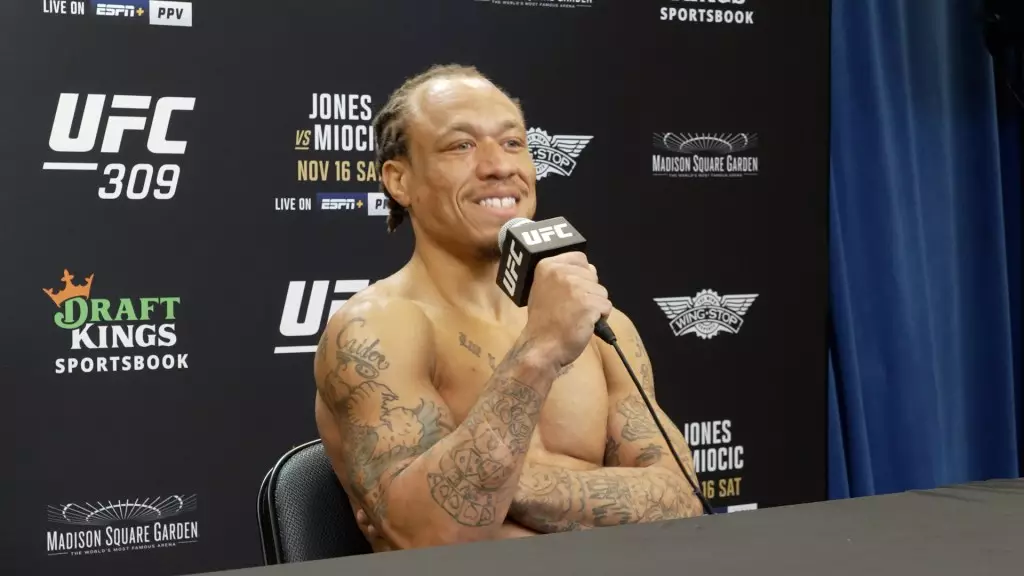The octagon of the Ultimate Fighting Championship (UFC) is no stranger to intense competition, and it was once again on vivid display during UFC 309 at New York’s iconic Madison Square Garden. In the highly publicized bantamweight bout, Marcus McGhee faced off against Jonathan Martinez, emerging victorious through a unanimous decision. This win not only marked McGhee’s sixth consecutive victory but also highlighted his growing stature within the competitive realm of mixed martial arts.
Dominance in the Octagon
The bout was characterized by McGhee’s striking superiority, as evidenced by the statistics that revealed he doubled Martinez in landed strikes. With a remarkable output, McGhee threw more than twice as many strikes as his opponent, displaying both volume and accuracy. Such performance under pressure often distinguishes a fighter and earns them respect from peers and fans alike. McGhee’s technique appears polished and strategic, solidifying his position as a top contender in the bantamweight division.
However, it is interesting to note that, despite putting forth a commendable performance, McGhee did not receive a post-fight bonus—a first in his four-fight UFC tenure. This slight could potentially fuel his desire for even more dominant performances in future fights. For McGhee, this should serve as motivation to leave no doubt in subsequent encounters, further emphasizing the fine line between recognition and anonymity within the UFC.
In his post-fight interview, McGhee took a moment to reflect on the match, particularly the challenge posed by Martinez’s powerful leg kicks. His comment, humorously characterizing Martinez as “half horse, half man,” highlights the respect he holds for his opponent’s skill set. Despite the challenge, McGhee successfully capitalized on his own strengths, landing decisive right-hand strikes that proved instrumental in his victory.
Notably, McGhee’s comments also revealed insights into his personal preferences regarding future fight locations. He explicitly expressed disinterest in competing in Brazil, despite acknowledging a fondness for Brazilian culture. Instead, McGhee appears to be keen on bringing the UFC back to Arizona, asserting a desire to fight in a familiar environment—a move that may resonate with local fans and enhance his performance.
As McGhee continues to rise in the UFC rankings, speculation arises regarding potential matchups against other top fighters, notably the legendary Jose Aldo. McGhee, acknowledging the proximity of their rankings, hinted at the possibility of a bout between them. This prospective matchup could present an intriguing narrative, showcasing a clash between experience and emerging talent.
However, McGhee is also acutely aware of the challenges this may pose. He remains respectful of Aldo’s legacy and skill level while expressing confidence in his own abilities. Such a matchup could not only elevate McGhee’s status within the sport but also create a captivating storyline for fans and analysts alike.
As UFC 309 fades into the background, McGhee’s sights are set on the future. His determination to improve and strive for greatness is unmistakable. In a sport as unpredictable as mixed martial arts, McGhee’s willingness to vocalize his preferences for opponents and locations suggests a fighter who knows what he wants and is unafraid to pursue it.
Ultimately, Marcus McGhee’s recent victory at UFC 309 exemplifies not only his physical prowess but also his mental fortitude. For a fighter in such a demanding sport, blending skill with self-awareness and ambition is crucial. As fans anticipate McGhee’s next bout, he embodies the essence of the fight game—always hungry for victory, recognition, and the opportunity to leave a lasting legacy. Whether he faces a legend like Aldo or another contender, McGhee’s journey has only just begun, and the MMA community is eager to see what lies ahead on his path to greatness.

